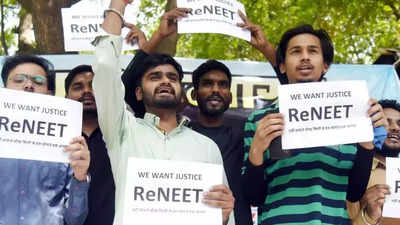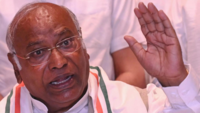- News
- India News
- Anti-paper leak law for exams takes effect
Trending
Anti-paper leak law for exams takes effect
The Public Examinations (Prevention of Unfair Means) Act - the first-ever national law against the use of unfair means to rig recruitment exams conducted by UPSC, Staff Selection Commission, Railway Recruitment Board, Institute of Banking Personnel Selection (IBPS) and entrance tests for central educational institutions like JEE, NEET and CUET - seeks to address issues related to unfair means in the conduct of these exams, which are not covered under the purview of the Bharatiya Nyaya Sanhita.

NEW DELHI: Amid the controversy over NEET-UG results and the cancellation of UGC-NET exam due to paper leak, the Public Examinations (Prevention of Unfair Means) Act, 2024 - the anti-paper leak law for examinations for central recruitment and entrance into central educational institutions that was passed by Parliament in Feb - came into effect on Friday.
"In exercise of the powers conferred by sub-section (2) of section 1 of the Public Examinations (Prevention of Unfair Means) Act, 2024 (1 of 2024), the central government hereby appoints the 21st day of June, 2024, as the date on which the provisions of the said Act shall come into force," said a gazette notification issued by the ministry of personnel, public grievances and pensions on Friday.
The Public Examinations (Prevention of Unfair Means) Act - the first-ever national law against the use of unfair means to rig recruitment exams conducted by UPSC, Staff Selection Commission, Railway Recruitment Board, Institute of Banking Personnel Selection (IBPS) and entrance tests for central educational institutions like JEE, NEET and CUET - seeks to address issues related to unfair means in the conduct of these exams, which are not covered under the purview of the Bharatiya Nyaya Sanhita.
The thrust of the proposed law is to crack down upon persons, organised mafia and institutions engaged in paper leaks, paper solving, impersonation and hacking into computer resources, often in collusion with elements within the "system", for monetary or wrongful gains. Bona fide students, whose future gets jeopardised due to undetected leaks, cancellation of exams and holding up of results, will not be liable for action.
Service providers and institutions found guilty of rigging public exams will have to bear the proportionate cost of examination, as per the law.
"In exercise of the powers conferred by sub-section (2) of section 1 of the Public Examinations (Prevention of Unfair Means) Act, 2024 (1 of 2024), the central government hereby appoints the 21st day of June, 2024, as the date on which the provisions of the said Act shall come into force," said a gazette notification issued by the ministry of personnel, public grievances and pensions on Friday.
The Public Examinations (Prevention of Unfair Means) Act - the first-ever national law against the use of unfair means to rig recruitment exams conducted by UPSC, Staff Selection Commission, Railway Recruitment Board, Institute of Banking Personnel Selection (IBPS) and entrance tests for central educational institutions like JEE, NEET and CUET - seeks to address issues related to unfair means in the conduct of these exams, which are not covered under the purview of the Bharatiya Nyaya Sanhita.
The anti-paper leak law provides for 3-5 years jail term and fine up to Rs 10 lakh for those impersonating a candidate, engaging in paper solving and not reporting an exam fraud. Those involved in organised crimes of cheating and other malpractices will face 5-10 years imprisonment and a minimum fine of Rs 1 crore.
The thrust of the proposed law is to crack down upon persons, organised mafia and institutions engaged in paper leaks, paper solving, impersonation and hacking into computer resources, often in collusion with elements within the "system", for monetary or wrongful gains. Bona fide students, whose future gets jeopardised due to undetected leaks, cancellation of exams and holding up of results, will not be liable for action.
Service providers and institutions found guilty of rigging public exams will have to bear the proportionate cost of examination, as per the law.
End of Article
FOLLOW US ON SOCIAL MEDIA












